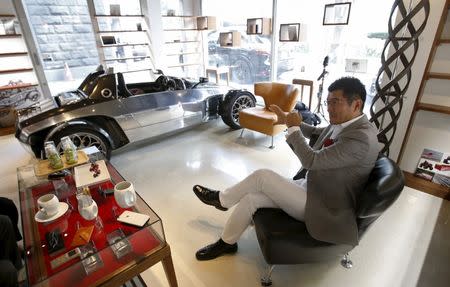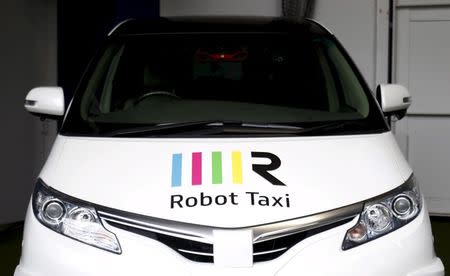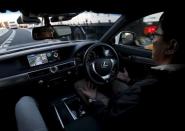In the rearview mirror: car designer warns on Google game changer
By Naomi Tajitsu and Norihiko Shirouzu
TOKYO (Reuters) - The days of cheap and cheerful cars like the Honda Civic and Toyota Corolla may be numbered as technology firms Google and Apple muscle into the auto industry, and change the way people own and drive cars.
That's the warning from Ken Okuyama, high-end Japanese designer of the Ferrari F60 Enzo and Porsche Boxster, who says game-changing self-drive technology could threaten Japan's position as a major car producer.
"If they don't watch out, they risk becoming just suppliers to those (tech) companies," Okuyama told Reuters in an interview at his industrial design studio in the Japanese capital ahead of this week's Tokyo Motor Show.
Okuyama, who made his mark at Italy's fabled Pininfarina studio and also redesigned the Chevrolet Camaro and Corvette, says taking on Google and Apple will be the ultimate test for Toyota and other mainstream automakers.
As writing code becomes as vital to car making as engineering, Japanese automakers are under pressure to show they can compete with the tech giants.
Google's fleet of self-driving cars includes a modified version of Toyota's Lexus sport utility vehicles, in addition to the pod-like, driverless Google Car prototype, both of which are being road-tested in the United States. Apple could roll out a self-driving vehicle in 2019.
Honda, which on Tuesday said it was developing a new automatic setting to be used in congested traffic, and technology to pre-program cars to drive automatically, acknowledged the potential threat from tech firms in the future.
"At this point, whether Google or Apple can come up with a car is unclear," said Koichi Fukuo, president of research and development at Honda. "But they are spending aggressively to recruit people to achieve that and in that sense ... we can't rule out the possibility they may eventually become a competitor."
MARKET TO SPLIT
As cars become more automated, Okuyama predicts the auto market over time may split into two camps: vehicles that simply fulfill public transportation needs such as self-driving taxis serviced by ride-hailing applications; and super-luxury cars that will be trophy items for the wealthy.
As a result, he says, car ownership will decline, decreasing demand for affordable, traditional cars like Honda's hugely popular Civic models.
"Automakers have used existing technology and road infrastructure to create cars which have an emotional connection with drivers. This is how they have been adding value to their products," Okuyama said.
"But cars have become commodity products, and, as such, they have to become more functional and even more affordable," he said, foreseeing a future where stripped down, minimalist 'commodity' cars would share the roads with luxury vehicles.
While this market polarization could be years away, Okuyama says Japanese automakers must focus even more on finding ways for cars to benefit from advanced technologies - an area where he says they have lagged for years.
"Self-driving cars will eventually become commonplace ... as a result, carmakers will have to sell not only the hardware, but also the overall system to run the cars," he said. "Companies like Mercedes and Toyota are looking at this, but Google is ahead in this game."
To be sure, Japanese automakers are starting to show off their own automated driving capability, with Toyota this month unveiling automatic lane changing and merging functions on a Tokyo highway. The world's largest car maker plans to market its first self-driving car in 2020.
Honda and Nissan have also set 2020, the year of the Tokyo Olympics, as a target date to bring advanced self-driving cars to the market.
Most automakers have focused on developing automated driving functions, such as automatic braking systems, parking and lane-changing capabilities which drivers can switch on or off.
Google and ZMP, a Tokyo-based robotics start-up which plans to introduce a robot taxi service in time for the Olympics, are taking automated driving a step further, developing cars with no steering wheel or pedals - taking humans out of the driving equation altogether.
Since returning to Japan in 2007 and starting his own design firm, Okuyama, 56, has focused on urban planning and public transportation projects, giving a facelift to some of Japan's 'bullet' trains and designing a concept line of farm equipment.
But slick, fast luxury cars remain close to his heart, and the high-tech sports cars Okuyama now designs for his own brand sit firmly in trophy car territory. A bespoke model he plans to unveil at the Tokyo show clocks in at a cool $1.3 million.
(Additional reporting by Maki Shiraki; Editing by Ian Geoghegan)
















